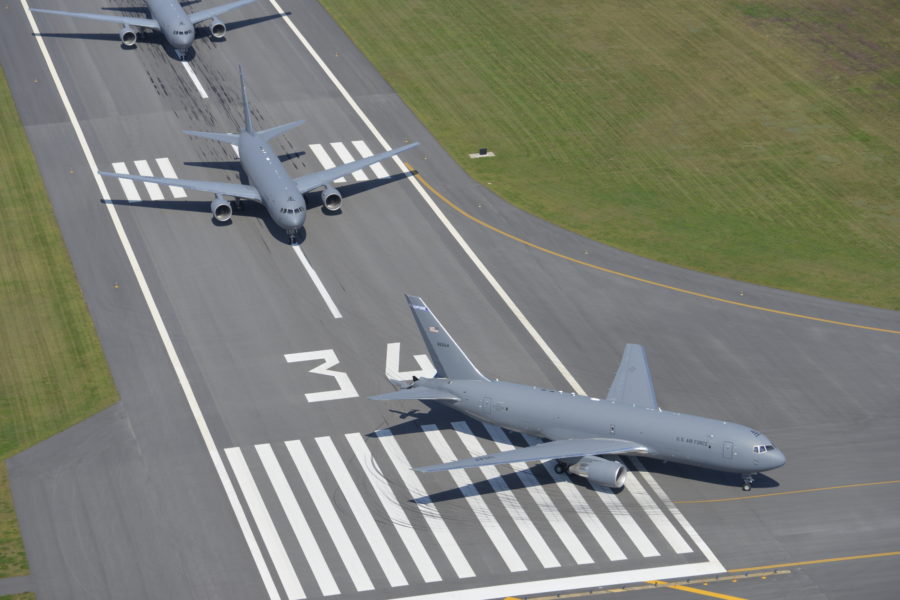Boeing reported a $3.3 billion loss in the third quarter of 2022, driven by deepening woes in its defense business, the company announced Oct. 26. Boeing’s defense, space, and security sector lost $2.8 billion in cost overruns on fixed-price development contracts.
The aerospace giant’s financial difficulties were highlighted by a $1.2 billion hit to the KC-46 Pegasus tanker and a $766 million loss on the VC-25B, better known as the new “Air Force One,” according to Boeing’s chief financial officer Brian West. Boeing also recorded losses on its USAF T-7A Red Hawk trainer, the Navy’s MQ-25 Stingray, and NASA’s Commercial Crew program.
“We’re not embarrassed by them,” Boeing CEO David L. Calhoun said of the cost overruns on an earnings call. “They are what they are, and we intend to deliver against these contracts and satisfy our customers.”
For years, Boeing pursued a strategy of offering aggressive bids for fixed-price development contracts. Those contracts put Boeing on the hook for extra costs associated with developing the programs. Calhoun conceded that was largely a mistake for the company.
“Eight-five percent of the business is doing pretty well,” Calhoun said of the defense side of the Arlington, Va.-based company. “It’s these fixed-price development programs that, unfortunately, we’re working our way through. We had to account for recent performance, including a reassessment of our forecast cost to complete. There’s no doubt about it.”
Losses on the KC-46 have now run up to over $6 billion. The Air Force’s initial contract for the aircraft was $4.9 billion.
West said the defense business’s issues were “primarily due to higher estimated manufacturing and supply chain costs as well as technical challenges.”
The KC-46 program encountered a substantial setback when Boeing and the Air Force announced that the Remote Vision System (RVS) 2.0 update would be delayed until 2025, 19 months more than previously planned. RVS 2.0 will be required for all KC-46s to fix problems with the current system used to operate the main refueling boom. Because the fix to the RVS also includes upgrades to display resolution and cameras, Boeing is on not on the hook for all costs. Instead, some will fall on the Air Force, though the company and the service have declined to get into further detail. The company said the KC-46’s issues stem from parts shortages and labor instability.
The new Air Force One jet ran into more trouble after the company signaled the program was getting on the right track earlier in the year. Boeing said the new costs stem from a tight labor market and supply chain issues. Security clearance issues for workers on the highly classified project make the labor issues particularly acute. Boeing agreed to a $3.9 billion contract for the new Air Force One after pressure from former President Donald Trump, who thought the price was too high.
The T-7 contract award followed a bid by Boeing of $9.2 billion to produce the Air Force’s new trainer that will replace the stalwart T-38 Talon. That deal, however, has cost Boeing more than anticipated and run into delays.
Trump got personally involved in the Air Force One contract cost, and Boeing agreed to produce the two VC-25B aircraft at a lower cost than initially planned.
“Well, it turns out our critics were right,” Calhoun said in an interview with CNBC. “We didn’t get enough price. That’s fairly obvious to all of us. In the meantime, we haven’t taken any of these fixed-price development contracts, and it’s not our intention to ever do so.”
Boeing recently made changes in the executive team of its defense division, also known as BDS. The company had a falling out with regulators and the general public following deadly crashes of its 737 Max commercial airliner, which was temporarily grounded. Boeing reported strong demand for the 737 Max, its marquee civilian airliner, in the third quarter of 2022. It has resumed deliveries of its 787 Dreamliner wide-body jet that had been halted after manufacturing defects.
While Boeing cited inflation as one factor driving its losses, the company did not try to blame the issue for all its troubles. The Department of Defense has signaled it may be willing to make adjustments for inflation to companies with fixed-price contracts such as Boeing. However, Calhoun or West did not raise the issue on the call with financial analysts despite repeatedly being pressed on Boeing’s defense losses.
After years of instability, safety, and quality concerns, Boeing’s main focus now is delivering what airliners and the Air Force have already ordered.
“I think that the thing we have to keep in mind is that our mandate is to stabilize and now deliver very important products to our customers who need them,” Calhoun said.
